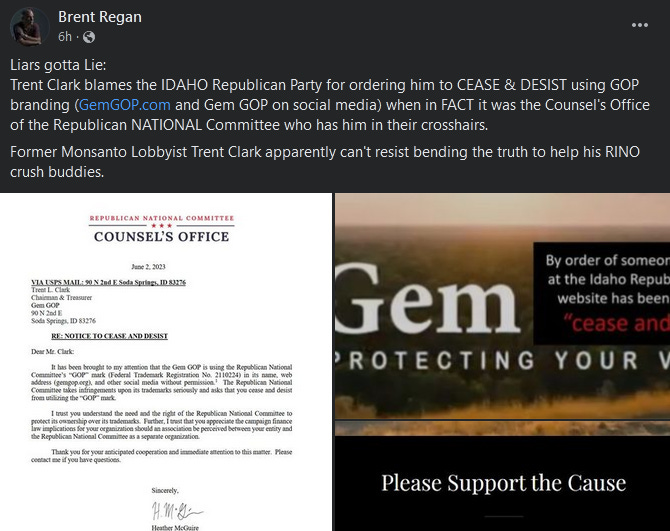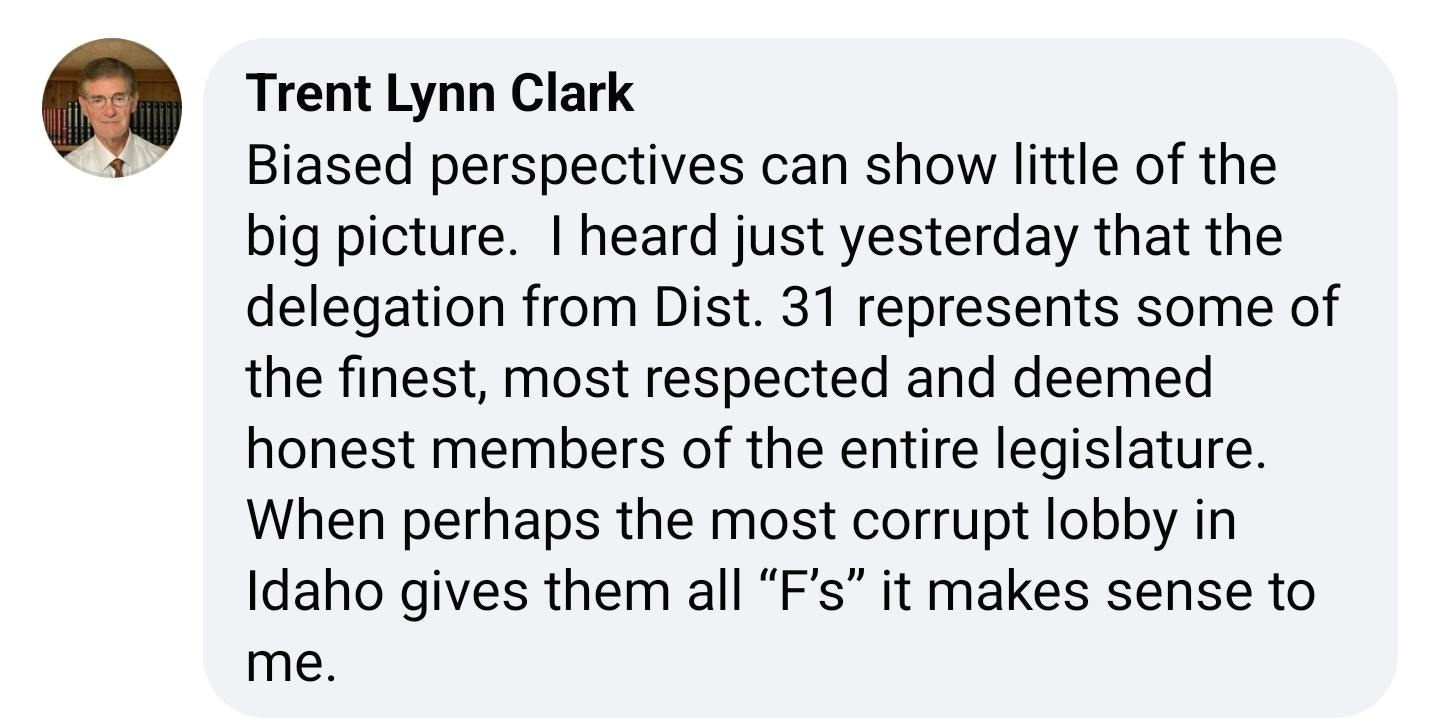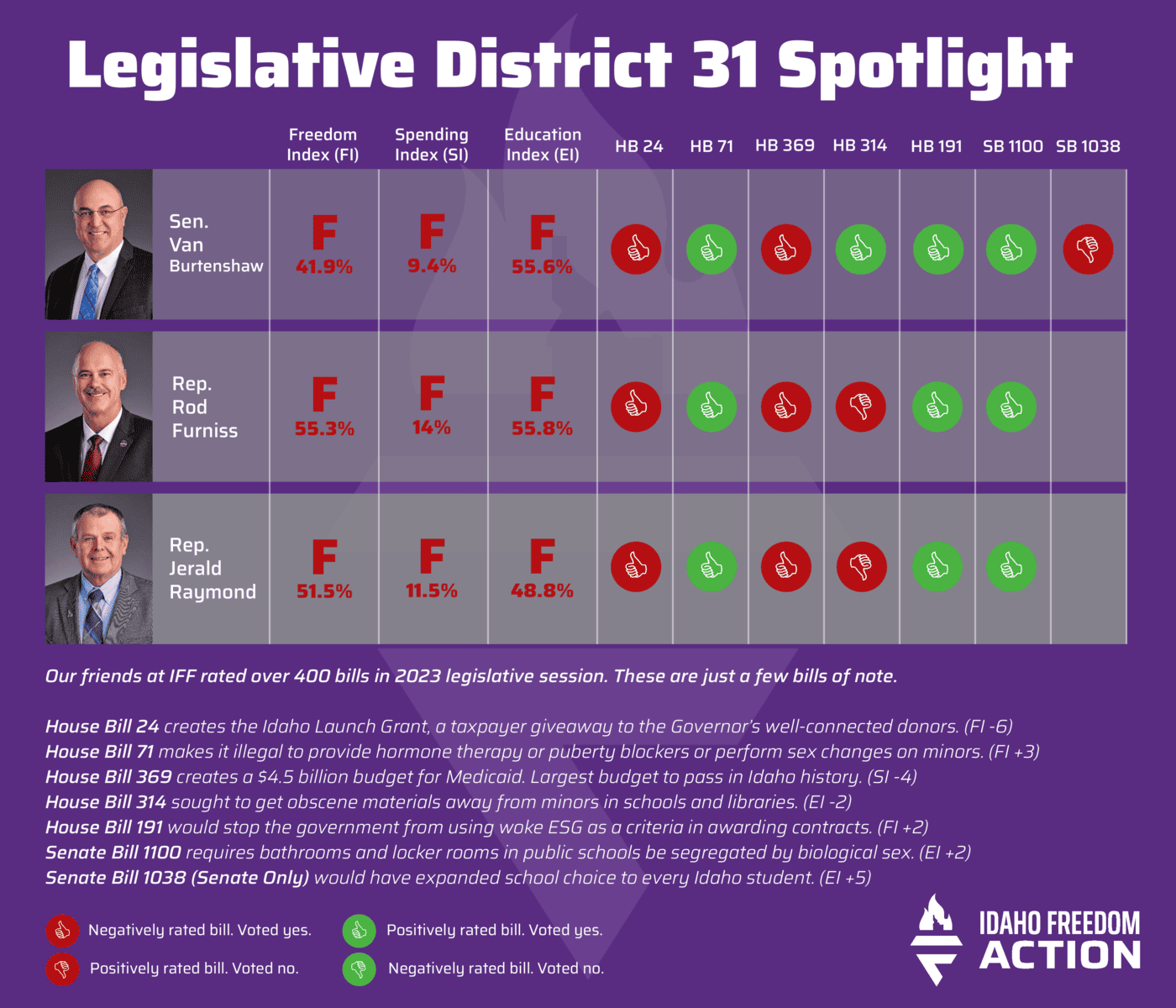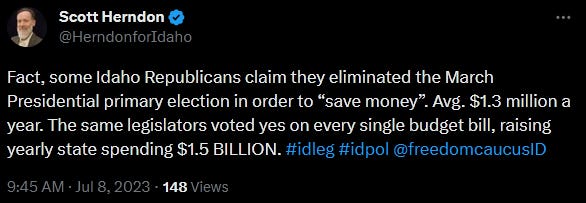Trent Lynn Clark is a longtime Republican activist, former state chair, and a regular commentator on political affairs. He and I disagree on a lot, but to his credit, he has always been willing to step into the arena of ideas and duke it out. I believe in iron sharpening iron, so I relish hard-hitting debate rather than running from it. Clark’s online rhetoric is extremely acerbic, which turns a lot of people off, but I don’t mind. Give me your strongest argument, and I’ll give you mine, and let the chips fall where they may.
Ever since Dorothy Moon’s landslide election as Idaho GOP chair last year, Clark has had an axe to grind against her and what he calls a “cabal” of “power-hungry extremists” who have taken control of the party. He has waged a one-man rearguard action on the Idaho GOP, writing column after column accusing them of being behind everything bad that has happened in our state recently.
In fact, Clark was recently chastised by the Republican National Committee for using the name “GOP” in his organization. He still decided to blame Dorothy and her minions, however.
Before I get into Clark’s article attacking fellow Republicans, let us define some terms. Clark has declared that he is the most conservative person in the Idaho GOP, that nobody is further to the right than him. I disagree with this, obviously, but perhaps we are simply defining the term differently.
I use the word conservative more or less as the name of my team. It’s imperfect but necessary. The term itself can run the gamut from paleoconservatives like Patrick Buchanan or Sam Francis, neoconservatives like Dick Cheney or Bill Kristol, social conservatives like Ted Cruz and Rick Santorum, MAGA conservatives like Donald Trump and Matt Gaetz, and libertarian conservatives like Rand Paul and Thomas Massie.
What do conservatives stand for?
Some conservatives believe that social issues such as abortion, transgenderism, and gay marriage are the defining ideas of the movement. Others believe it is low taxes and deregulation. Still others focus entirely on 2nd Amendment rights. Ask five conservatives which issue is most important and you’ll get at least five different answers.
Once upon a time, most of us supported foreign wars such as Vietnam, Afghanistan, and Iraq. Today, many conservatives oppose militarism and are worried about continued support for Ukraine in its conflict with Russia. The Democrats, ironically, are now the party of Big War, while many Republicans have adopted President Eisenhower’s suspicion of the military-industrial complex.
Once upon a time, nearly all conservatives supported free trade. Yet many of us have finally heard the warnings of Ross Perot from so long ago, and Donald Trump showed us that tariffs could be beneficial when applied wisely. Under Trump, the ideas of buying American and hiring American were more than empty bromides for the first time since Reagan. Republicans are coming around to recognizing the incredible harm done to the American working man by NAFTA and Chinese outsourcing.
Once upon a time, conservatives supported big business. The twin protests of Occupy Wall Street on the left and the Tea Party on the right were concerned with big corporations and big government, respectively. Since then, big corporations have embraced wokeness in the form of ESG and left-wing social policies, and so the left has become their biggest cheerleaders. Many on the right, on the other hand, have come to realize that both big business and big government are big problems.
You can see the issue here, right? I suspect that most people’s view of the political landscape becomes calcified at a certain moment in history. If a bog-standard Republican from 2003 woke up after 20 years asleep, they probably wouldn’t recognize their party. I don’t think that Trent Clark or many of his generation realize how much the landscape has changed in the last few decades. They’re still operating on an old model of conservative politics.
You will often see conservatives suggest that all our problems could be solved if only we returned to the wisdom of Ronald Reagan. This reflects nostalgia, I think, for a time when Republicans were winning massive landslides and appeared to be driving culture and policy. Yet as great as Reagan was, he was a man of his time, and simply pointing to his successes from 40 years ago does nothing to address the issues we face today.
Reagan nostalgia also ignores the fact that we are not the same country we were in 1984. We have changed significantly in demographics, in religion, in the basic ideas of what it means to be a good person. Our culture is rapidly moving leftward. A position that was moderate ten years ago is considered conservative today, while a position that was conservative ten years ago is called radical, extreme, or far-right.
I think most people develop an idea of the way things should be based on the Overton Window at the time they come of age or become politically active — this is what I mean by calcified. The result of this is that every generation of conservatives, rather than rolling back the most recent progressive gains, instead crystallizes them. Auron MacIntyre compares this to a ratchet, with the left moving the gear and the right preventing it from moving back.
Republicans in the 1940s and ‘50s could not roll back the New Deal. In the 1970s and ‘80s, they did nothing to reverse the Great Society. In the 2010s, despite controlling the House, the Senate, and the presidency, they could not even repeal Obamacare or defund Planned Parenthood.
This is the paltry record of success that the conservative movement has to boast about. In a sense, then, conservatism has completely failed because they have conserved very little over the past century. Yet rather than looking for new strategies, many Republicans continue doubling down on that history of failure.
Some are learning, however. Sen. Marco Rubio of Florida was once a Tea Party darling, then the establishment’s hope to stop Donald Trump. He recently published a book called Decades of Decadence that takes an honest and critical look at the conservative movement since the time of Reagan. Emily Jashinsky at The Federalist reviewed the book this week:
“Decades of Decadence” knits together familiar arguments from the last half-decade of realignment politics, rightfully evaluating our culture, economics, and foreign policy to build a comprehensive analysis of decline. The book could serve as a basic primer on the emergent conservative argument about American malaise.
She goes on to identify Rubio’s thesis:
Where some may see tension between the Rubio of 2010 and the Rubio of 2023, the senator confronts head-on the idea that Reagan conservatism — revamped early in his career as Tea Party conservatism — is dead. If anything, Rubio argues, Reaganism is willfully misunderstood by the GOP’s business-friendly permanent political class.
The book’s most interesting moments are actually observations pulled from 13 years in the upper chamber. Reflecting on the Reagan revolutionaries who later camped out in D.C., Rubio writes with unexpected aggression. “I am struck now by just how well entrenched those former radicals had become in Washington by the time I arrived,” he says. “Every policy meeting, every think tank, every lobbyist and interest group—all of them seemed to be a decade behind, part of what some referred to as Conservative, Inc.”
I would advise Trent Clark and other veteran Republicans to read this with an open mind, to understand how you can’t build 21st-century policy on rose-colored memories of the past.
In any case, the label conservative remains a reasonable shorthand for our side, and debates about who is more conservative will never be fully resolved. The Thomas Deweys, Nelson Rockefellers, John McCains, and Trent Clarks will continue calling the Bob Tafts, Barry Goldwaters, Rand Pauls, and Brian Almons of the world radical extremists, and we will continue to see them as compromising moderates.
Here in Idaho, nearly every Republican is pro-life, supports the 2nd Amendment, and wants lower taxes. Beyond that, however, opinions vary wildly. I would suggest that someone like Sen. Scott Herndon, who voted against bloated budgets and wants abortion completely banned, is more conservative than someone like Rep. Rod Furniss, who rubber-stamps every spending increase he sees and thinks taxpayers should pay for feminine hygiene products in public schools. But that’s just my opinion, of course.
With all that said, let us examine the most recent column. Trent Clark’s words are in block quotes, and my responses follow:
Most reports on the Challis mid-year meeting of Idaho’s Republican State Central Committee called it “conservative” or even “extreme conservative.” That labeling is wrong. Yes, a few “conservatives” were there, but we no longer make the decisions.
As I said, Clark believes he and his friends are the only true conservatives in Idaho.
At least in this century, and likely the next one to come, American “conservatism” is a movement owing its origins and meaning to one seminal work published in 1960, Barry Goldwater’s “Conscience of a Conservative,” ghost-written by Brent Bozell Jr.
Instaread.co describes “Conscience” as “an essential read for anyone looking to understand the roots of the conservative movement in the USA.” It is hailed as “influential” by celebrities ranging from Ronald Reagan to Tucker Carlson. Mike Huckabee calls it “the handbook of what it means to be conservative,” and Hillsdale College’s Burt Folsom dubbed it “the book that changed all our lives.”
But the definition of “conservative” advanced in “Conscience” doesn’t describe the mindset, leadership style or direction of the current majority running Idaho’s GOP. Here is why:
Barry Goldwater is an interesting figure for Clark to bring into the discussion. He staked out a strong conservative position in the early 1960s as an alternative to the Republican establishment of the day as personified by New York Governor Nelson Rockefeller. The establishment wing of the party tarred him as an extremist — that sounds familiar! However, he was annihilated in the 1964 presidential election by Lyndon Johnson in one of the biggest landslides in American history.
In his memoirs, Richard Nixon wrote that Goldwater had a habit of alienating potential allies by being too quick to denounce anyone he perceived as being disloyal. In 1994, the Washington Post wrote a puff piece about how Goldwater was working with leftists in the cause of gay rights. In short, Goldwater seems to be the sort that Trent Clark would denounce as the same wrong kind of Republican as Dorothy Moon or Brent Regan.
The book Clark mentions, Conscience of a Conservative, was ghostwritten by Brent Bozell Jr, William F. Buckley’s brother-in-law, in 1960. While it is a great book and does a good job of defining the conservative movement, it is also 63 years old. Yet this is what Trent Clark chooses to hold up as the evidence that the current Idaho GOP leadership is not truly “conservative.” Remember what I said about calcified views?
Obviously, principles are timeless, but notice how Clark’s accusations in his essay have nothing to do with ideology. Rather, they are mostly related to party organization and rhetoric. I believe that veteran Republicans like Clark have lost sight of the true purpose of politics — to elect lawmakers who will implement policies that protect our freedoms — and have gotten lost in petty bickering over who gets to make the rules.
“Conservatives” believe rules, to be valid, should be rooted in “natural law.” It is the fundamental premise behind “limited government,” that laws must flow only in defense of natural rights.
I would agree with this. I wonder if Clark would apply this definition to much of what his Republican friends have supported recently, such as taxpayer-funded college and job training, massively bloated Medicaid and public education budgets, and driver’s licenses for illegal aliens.
In another post, Clark lamented that some of his favorite legislators scored F’s on the Idaho Freedom Index. It is disingenuous to accuse IFF of “giving” them F’s, of course; IFF does not rate legislators — they rate bills. Their metrics are transparent and objective, unlike Clark’s friends at IACI. (Clark himself chaired IACI at one point, as did Gov. Brad Little.) Legislators themselves earn their ratings with the way they vote.
Idaho Freedom Action has been creating spotlights for each district, sharing lawmakers’ grades and showing how they voted on some key issues. Both IFF and IFA give you the tools to see for yourself how your legislators are representing you, rather than simply taking Clark’s word for it that they are “some of the finest, most respected, and deemed honest members of the entire legislature.”
I believe it is a totalitarian tell when people complain about voters being given more information. Without the work of county committees like Brent Regan’s KCRCC or the Idaho Freedom Foundation, most voters have nothing to rely on except IACI-financed mailers lauding establishment candidates as true conservatives. Of course, such information runs counter to Clark’s narrative, so he calls IFF “the most corrupt lobby in Idaho” and “Idaho’s dark money lobby.” This is rich coming from someone with IACI, Bayer, and Pfizer on his resume.
Clark continues:
Political parties have a “natural law” purpose and power that comes from it. Since the days of Hamilton and Jefferson, a party’s strength derived from hard work — the work of connecting people, mobilizing them, coalescing a majority to support a winning ticket with shared values.
That power can even purge the unfaithful. Republicans who supported Roosevelt’s New Deal soon found their party “voted with their backsides.” A “New Deal” Republican found no campaign volunteers, no one willing to canvas precincts, no network to get them elected. They didn’t survive.
But the current Idaho GOP leadership disconnects party power from work, not realizing work is what, under natural law, gives parties power. They prefer to govern by fiat and write rules forcing compliance with an increasingly inward-looking “platform.” Coming out of Challis the party now “purges” through threat and intimidation: do what we say or be censured, de-platformed or “RINO-ized.”
Maybe he doesn’t notice out there in Soda Springs, but Dorothy Moon and her team are actually doing a terrific job of “connecting people, mobilizing them, coalescing a majority to support a winning ticket with shared values.” Under Moon’s leadership last fall, the Idaho GOP had one of its most successful years ever, and the party has expanded its grassroots efforts for 2024.
Clark implies that this new cabal is responsible for the platform, but he has it backward. The platform is written by the people, the delegates elected to represent every registered Republican in Idaho at the semiannual convention. The engaged Republicans of Idaho have crafted a platform that is perhaps the most conservative it has been in decades, and those same people elected leadership that supports that platform. What Clark sees as top-down autocracy is really bottom-up republicanism, but he doesn’t like the results so he denounces it.
“Conservatives” believe in the individual. Faith in a person’s ability to govern themself is why conservatives don’t seek “bigger government.” The current GOP leadership distrusts individuals. “Do you want to be governed by someone who watches MSNBC?” they ask.
I’m not sure where Clark is going with this. Ultimately, we still answer to the voters, the question is, how do we deliver accurate information so voters can make informed choices? Our culture is marinated in progressivism. Americans are inundated with left-wing ideas from the cradle to the grave. Our job as political activists is to provide an alternative and to motivate like-minded voters to go to the polls and exercise their civic duties. Once again, it seems that Clark’s issue is that voters are receiving information that he personally doesn’t like.
They don’t even trust Republicans to choose their own candidates. They want the benefits of being a “party,” but covet endorsing in primaries like chambers of commerce or union halls.
There is a serious problem in Idaho of leftists registering as Republicans and voting in our primaries. The data is clear that this absolutely happens, especially in 2022. Democratic Party leaders urged their voters to do this and made sure that nearly every Democratic primary candidate ran unopposed so there was little reason to vote on a Democrat ballot. Yet establishment GOP folks like Trent Clark pretend that this isn’t happening, probably because they are quite aware that such crossover voting benefits their side.
It’s a fact that the former leadership, far from being hands-off in the primaries and letting voters make their own choices, worked to boost establishment candidates. Remember then Idaho GOP chair Tom Luna preemptively declaring that Ammon Bundy was not welcome in the Republican primary? That doesn’t sound like trusting the voters to me.
Allowing GOP committees to do the work of investigating candidates and making recommendations should only be feared by leftists in conservative clothing.
“Conservatives” support healthy inquisitive minds, knowing the ability to reason underscores the validity of self-government. Idaho’s GOP leaders voted first in Challis to allow medical marijuana, then to allow recreational marijuana, and now have a platform that not only fails to oppose routine illegal drug use but is silent on whether it is okay to sell these poisons to Idaho’s youth.
In fairness, they’ll say they’re not for “legalization.” They just don’t support “criminalization,” making their position on drug use identical to that of the Biden Administration.
There was a resolution regarding marijuana at the recent meeting, but it failed. The issue of drugs is intricate, but some Republicans like Trent Clark want to boil it down to civilization versus reefer madness. I’m no fan of drugs, but I find the policy arguments complex. Marijuana is banned, while alcohol is legal — does that really make sense? Every argument about the one can be made about the other.
My boss at IFF Wayne Hoffman recently wrote a very good and nuanced piece explaining his position on drugs, and I think it’s worth your time to read, even if you still disagree in the end.
The elephant in the room with the drug debate is that Big Pharma is the largest and deadliest drug dealer in America. Doctors are given incentives to prescribe new drugs — that’s how fentanyl first became a problem, and now it’s killing hundreds of thousands of people each year. Drug companies can advertise on television, exhorting viewers to ask their doctors about this or that new narcotic. In the case of vaccines, not only have Pfizer, Moderna, and Johnson & Johnson set up a perfect grift in which their products are mandated and taxpayer-funded, but vaccine makers are completely exempt from liability when their products cause harm. Imagine a marijuana dealer scoring such a deal!
It is interesting to note then that Trent Clark worked for many years as a lobbyist for Bayer, as well as with Monsanto and Pfizer. Is he pointing the finger at marijuana to distract from the fact that his former employers are constantly being fined for malfeasance regarding their (legal) drugs? I wonder if this is another symptom of what Emily Jashinsky referred to as the “GOP’s business-friendly permanent political class” — a willingness to implicitly trust whatever some big corporation prescribes while distrusting anything that is not commercialized and taxed.
Again, I’m no fan of marijuana or any other hard drugs. I feel bad even taking ibuprofen for the occasional headache. But let’s have some perspective here. Clark wants to paint everyone to his right as a stoned loser, and that’s just absurd, especially considering his own background.
“Conservatives” walk their talk of limited government. Republicans have previously avoided placing too much power in the hands of a small “super-empowered” bureau of senior party leaders. Under the Challis rules, a panel of 15 now controls which counties send delegates to conventions for free, and which must first fork over thousands in political donations.
County parties have long supported the operations of the state party. Lately, some counties have been making a stink about not wanting to pay their fair share. The state central committee created a mechanism to enforce these dues. It’s an imperfect solution to a vexing problem.
“Conservatives” believe government closest to the people governs best. The Challis crowd of “state” leaders micromanaged the bylaws of every county and every legislative district.
I’m not quite sure what he is referring to here. Several proposed rules that could be seen as micromanaging county and legislative district committees were defeated. Most of the rules that passed gave more leeway to the lower committees, but once again, Clark didn’t like that outcome so he casts it as anti-republican.
Lastly, “conservatives” are fiscally tight with taxpayer money. The Challis crowd “demanded” Idaho taxpayers fund two partisan primaries in 2024, one in March and another in May, totaling nearly $8 million redistributed from all taxpayers to benefit just Party activists.
It will never not be amusing when establishment figures lament the cost to taxpayers of one issue they dislike for other reasons while supporting massive budgets in other areas. It’s the very definition of needing to take the log from your eye before picking out the speck in your brother’s. Sen. Scott Herndon said it well on Twitter today:
To paraphrase Texas Sen. Lloyd Bentsen, “I have labored in the Party with conservatives, I know conservatives, conservatives are my peeps. Madam Chairwoman, these are no conservatives.”
It’s fitting that Clark closes his essay by paraphrasing a quote from a Democrat. Take note of which self-described conservatives run to the left to attack fellow Republicans. Just last week Clark took to the pages of the liberal Idaho Statesman to attack the Idaho GOP. Is that what conservatives do?
Trent Clark of Soda Springs has worked within the Republican Party for 40 years and has served in the leadership of Idaho business, politics, workforce and humanities education.
Nothing I say here should be taken as a denigration of Clark personally or his many years of work within the Idaho GOP. He has a lovely family, and all our interactions in person have been amicable. Yet I felt compelled to write this response because a lot of what he said was nonsense, sour grapes from someone who doesn’t like where the party is going.
Politics moves fast these days. Again, while principles are timeless, strategy, tactics, and the issues themselves change with the times. I believe that with their wisdom and experience, longtime veterans like Trent Clark have a lot to offer the discourse today, but they must also recognize that it’s not 1984 anymore. Reagan, Goldwater, and Buckley are long gone. The Republican Party is not a party of ghosts, but of living, breathing human beings who must confront the times we live in with a positive vision of what we want our society to be. That will not be accomplished by living in the past nor by sniping at those who are doing the work of building the future.











You are elected political representatives. You are not Gods, you are human, never forget that. You all need to listen to us, we are getting seriously pissed off at all the childish bickering. DO THE Job we sent you to do.
STOP the left. STOP the Evil. THIS is IDAHO. The last bastion of Freedom.
Too many of you knuckleheads need to leave. You need to retire. You are living in a fantasy FUSA that does not exist anymore.
I’ll prolly catch shit for this comment, wont be the first time, prolly not the last either.
Brilliant commentary, Brian. I fully agree with all your views, except perhaps regarding marijuana. Yes, the alcohol and drug laws are inconsistent; however, the fact that one potentially damaging substance (alcohol) is allowed by law does not make it OK to allow another (marijuana). I’ve seen the result of lax drug laws in CA and OR -- a slide that has destroyed entire states and individual brains! For those who need medical marijuana, regulate it as a prescription drug, which it should be. (And yes, I totally agree about the incredible dangers and power of Big Pharma -- but the Pharma industry must be addressed separately.)
Thank you, Brian, for standing against the powerful influences in both parties that continue to destroy “We the People” and for supporting and representing the grass roots growing within the Republican Party. It seems that calling someone “extremist” is enough to bump them out of contention; but it shouldn’t. Today’s extremist is tomorrow’s centrist, often because the extremist viewpoint was correct and the Overton Window just needs more time to open!
It’s incredibly shameful that the Republican Party treated Ammon Bundy and other “outsider” Republicans so horribly; had these people been elected, our state and nation would have far fewer problems because these “liberty” folks would have fought for the people who pay their salaries and want to live free of government tyranny.
My definition of a “true conservative:” Someone who stands for and believes in the principles of America’s founding documents (Declaration of Independence, Constitution, and especially the Bill of Rights), all of which are based on Natural Law. That’s the bottom line and it appears to be so for Idaho Freedom Foundation (IFF) and Idaho Freedom Action (IFA) as well.